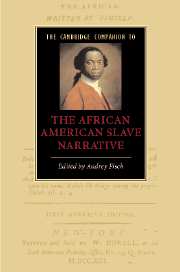Book contents
- Frontmatter
- Introduction
- Part I: The Slave Narrative and Transnational Abolitionism
- Part II: The Slave Narrative and Anglo-American Literary Traditions
- Part III: The Slave Narrative and the African American Literary Tradition
- 8 The slave narrative and early black American literature
- 9 Telling slavery in “freedom’s” time: post-Reconstruction and the Harlem Renaissance
- 10 Neo-slave narratives
- Part IV: The Slave Narrative and the Politics of Knowledge
- Further Reading
- Index
8 - The slave narrative and early black American literature
from Part III: - The Slave Narrative and the African American Literary Tradition
Published online by Cambridge University Press: 28 July 2007
- Frontmatter
- Introduction
- Part I: The Slave Narrative and Transnational Abolitionism
- Part II: The Slave Narrative and Anglo-American Literary Traditions
- Part III: The Slave Narrative and the African American Literary Tradition
- 8 The slave narrative and early black American literature
- 9 Telling slavery in “freedom’s” time: post-Reconstruction and the Harlem Renaissance
- 10 Neo-slave narratives
- Part IV: The Slave Narrative and the Politics of Knowledge
- Further Reading
- Index
Summary
There is perhaps no stronger impetus within the study of Black American literature and culture than the will to return, the desire to name the original, the source, the root, that seminal moment at which the many-tongued diversity of ancient West Africa gave way to the monolingualism of black North America. This explains why within the span of no more than fifty years the polite nomenclature that has been used to define “us” has moved decidedly backwards. Colored, Negro, Black and finally African. With each renaming one imagines a people groping ever closer to the mystery of their collective truth, a truth always buried within an always heavily veiled past. Thus it should come as no surprise that our theoretical and historical practices so often work to reiterate a sort of “Big Bang” conception of Black American life and culture. Bang. An organic, if multiform, African whole was assaulted, destroyed, and scattered to the far ends of the globe. And, miraculously, modern Black American culture developed at those many awkward locations at which the broken shards of ancient Africa caught, coalesced, melted, and melded into a new and vibrant people. This is, in fact, the idea that stands behind the notion that black literature presumably became more muddled and less sophisticated as it moved from the “simple truths” articulated with slave narratives and toward the “complicated imaginings” of presumably more creative forms.
- Type
- Chapter
- Information
- The Cambridge Companion to the African American Slave Narrative , pp. 137 - 149Publisher: Cambridge University PressPrint publication year: 2007
- 4
- Cited by

